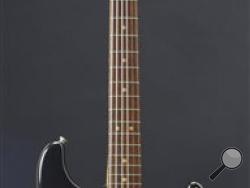Dylan's electric guitar sells for nearly $1M
Posted: December 7, 2013 - 3:51am
NEW YORK (AP) -- Like Elvis' no-hips-allowed appearance on "The Ed Sullivan Show," or the Beatles' arrival in America, or Woodstock, it is considered one of the milestone moments in rock history: Bob Dylan going electric at the 1965 Newport Folk Festival.
On Friday, the Fender Stratocaster that Dylan plugged in at the festival sold for nearly $1 million -- the highest price ever paid for a guitar at auction.
A buyer identified only as a private individual agreed to pay $965,000 at Christie's, including the auction house's fees, for the sunburst-finish electric guitar.
Dylan's legendary performance at the festival in Rhode Island 48 years ago marked his rupture with the folk movement's old guard and solidified his shift away from acoustic music, like "Blowin' in the Wind," toward amplified rock, such as "Like a Rolling Stone."
The raucous, three-song electric set was booed by some in the crowd, and folk purists saw Dylan as a traitor and a sellout.
But "his going electric changed the structure of folk music," said Newport Folk Festival founder George Wein, 88. "The minute Dylan went electric, all these young people said, 'Bobby's going electric. We're going electric, too.'"
Christie's had expected the guitar, which was sold with its original black leather strap and Fender hard-shell case, to go for far less: $300,000 to $500,000.
The previous record for a guitar sold at auction was held by Eric Clapton's Fender, nicknamed "Blackie," which sold at Christie's for $959,500 in 2004.
Dylan's guitar had been in the possession of a New Jersey family for nearly 50 years after the singer left it on a private plane.
The pilot's daughter, Dawn Peterson of Morris County, N.J., said her father asked Dylan's management what to do with the instrument, and nobody ever got back to him.
Last year, she took it to the PBS show "History Detectives" to have it authenticated, and rock-memorabilia experts matched its wood grain to close-up color photos of Dylan's instrument at the 1965 festival.
Dylan's attorney and his publicist didn't respond to email and phone requests for comment. Dylan and Peterson, who declined to be interviewed, recently settled a legal dispute over the items. The terms weren't disclosed.
In embracing electric guitar, Dylan was credited with infusing rock with the depth and complexity of literature.
In truth, Dylan had gone electric well before the 1965 Newport Folk Festival. Months earlier, he released the album "Bringing It All Back Home," one side of which was electric. And the single "Like a Rolling Stone" came out just days before the festival.
But his performance at one of folk's biggest showcases -- in front of some of the purest of folk purists -- caused a sensation.
Exactly what happened at the festival on July 25, 1965, has become enshrouded in legend, and debate persists over whether those who booed were angry over Dylan's electric turn or were upset over the sound quality or the overly brief set.
Backed by a rock band that included Mike Bloomfield on guitar and Al Kooper on organ, Dylan played such songs as "Maggie's Farm" and "Like a Rolling Stone." He returned for an acoustic encore with "It's All Over Now, Baby Blue."
Legend has it that Pete Seeger, one of the elder statesmen of the folk movement, was so angry that he tried to pull the plug on the electric performance or threatened to cut the cable with an ax.

